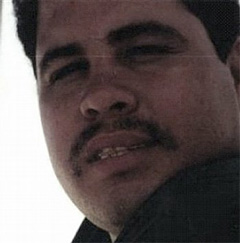
|  |  |  News Around the Republic of Mexico | September 2009 News Around the Republic of Mexico | September 2009  
Mexico Catches Suspect in Border Incursion, Deaths
 Associated Press Associated Press
go to original


| | This undated file photo made available by the U.S. Drug Enforcement Administration in El Paso, Texas, Friday, April 4, 2008 shows Jose Rodolfo Escajeda, 31. Mexican soldiers arrested the suspected drug gang leader linked to a 2006 border incursion by armed traffickers in Texas and the killing of an anti-crime activist in July, the army said late Saturday Sept. 5, 2009. (AP/U.S. Drug Enforcement Administration) |  |
Ciudad Juarez, Mexico — Mexican soldiers arrested a suspected drug gang leader linked to a 2006 border incursion by armed traffickers into Texas and the killing of an anti-crime activist in July, the army said late Saturday.

The army said in a statement that soldiers acting on a tip about armed men detained Jose Rodolfo Escajeda in Nuevo Casas Grandes, in northern Chihuahua state.

Escajeda and three other suspects detained with him Friday allegedly worked for the Juarez cartel, named after the border city of Ciudad Juarez, across from El Paso, Texas. The suspects were riding in bullet-resistant vehicles.

The army said Escajeda, who is wanted by the U.S. Drug Enforcement Administration, and the other suspects were turned over to Mexican prosecutors. It did not say whether he would be extradited to face charges in the United States.

A U.S. federal grand jury indictment names Escajeda as "allegedly responsible for an incursion into the United States" as well as drug charges, according to the DEA.

On Jan. 24, 2006 at least 10 men in Mexican military-style uniforms crossed the Rio Grande into the United States on a marijuana-smuggling foray, leading to an armed confrontation with Texas law officers near Neely's Crossing, Texas, about 50 miles (80 kilometers) east of El Paso.

State police tried to stop the three sport utility vehicles, which made a quick U-turn and headed south toward the border, a few miles away.

When the SUVs reached the Rio Grande, police saw the occupants of a green, Mexican army-style Humvee apparently waiting for the convoy.

Police stopped and watched as the vehicles began to cross the shallow river into Mexico. Both sides – the Americans and the smugglers – had their weapons drawn, though no shots were fired.

The Mexican army statement called Escajeda "a lieutenant and one of the main operators" of the Juarez cartel, and linked him to the border incursion.

It said Escajeda is also presumably responsible for the killing of anti-crime activist Benjamin LeBaron and a neighbor near Nuevo Casas Grandes on July 7.

LeBaron – who held dual U.S. and Mexican citizenship – had led protests in May demanding the release of his brother Eric, who was kidnapped and later released.

The killing sparked outrage in Mexico, where more than 13,500 people have died in drug-related violence since the government launched an offensive against cartels in late 2006.

While the cartels frequently target police and other gangs, it was the first time in recent memory they killed an anti-crime activist.

LeBaron belonged to an immigrant farming community founded decades ago by people who claimed they practiced fundamentalist Mormon beliefs.

According to a 2006 DEA statement, the U.S. indictment charges Escajeda with "conspiracy to import and distribute controlled substances. Upon conviction, he faces between 10 years and life in federal prison plus a maximum $4 million fine."

It said his gang controlled a large trafficking corridor spanning about 120 miles (190 kilometers) south of the border near El Paso. |

 |
|  |



